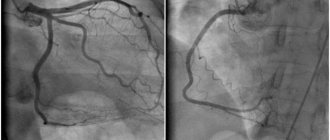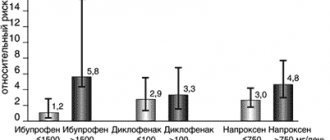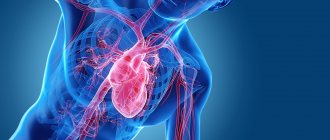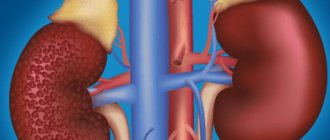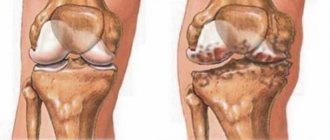Home / Cardiologist / Treatment of vascular insufficiency
Vascular insufficiency is a phenomenon that is associated with the pathology of the circulatory system due to deterioration in the tone and elasticity of blood vessels, as well as problems with the passage of blood through them and directly with the amount of blood itself. As a result of a decrease in blood flow speed, the transport of oxygen and nutrients across cell membranes is disrupted. Hypoxia develops and the functioning of cells and tissues is disrupted.
Pure vascular insufficiency is rare; most often, heart muscle insufficiency occurs simultaneously with symptoms of vascular insufficiency.
Types of vascular insufficiency
Based on localization, vascular insufficiency can be divided into: regional (affecting a specific part of the body) and systemic (affecting the vessels of the whole body).
According to the speed of formation and progression, acute and chronic vascular insufficiency are distinguished.
- Acute failure develops when there is a sharp drop in the level of pressure in the vessels, for example, with cardiogenic shock due to myocardial infarction. Characterized by the development of collapse due to a pronounced drop in blood pressure.
- Chronic failure develops over time when blood pressure drops below 100/60 mmHg. This concept includes a wide group of diseases: thrombophlebitis, vertebrobasilar insufficiency, coronary heart disease, mesenteric vascular insufficiency and other conditions accompanied by ischemia. Chronic vascular insufficiency can be primary (develops when the activity of the autonomic nervous system is disrupted) and secondary (due to various diseases).
Causes of vascular insufficiency
The acute variety occurs in various cardiac pathologies, massive blood loss, poisoning, severe infections, adrenal insufficiency, organic damage to the nervous system, extensive burns, traumatic brain and general injuries.
The root causes of the chronic form are autonomic and neurological factors, organic lesions of the brain stem and heart, in which there is hypotension with constant low blood pressure and, as a consequence, constant systemic hypoxia of organs and systems, the impossibility of adequate tissue perfusion with increasing consumption due to stress.
Symptoms of vascular insufficiency
Manifestations of vascular insufficiency depend on the type of insufficiency.
Acute vascular insufficiency
- Collapse – develops with a sharp decrease in blood pressure. It develops suddenly, when within a few seconds a person begins to feel severe weakness, noise in the head, dizziness, and the appearance of a “veil” before the eyes. The man loses consciousness. The patient's skin is pale, cold, breathing is rapid and shallow.
- Fainting – develops with a sudden disruption of cerebral circulation. The patient loses consciousness for several seconds or minutes, followed by darkening of the eyes, ringing in the ears, and severe weakness.
Chronic vascular insufficiency
Has signs of ischemia of organs and tissues, which has not clearly expressed signs:
- Cold extremities
- Blue discoloration of soft tissues in the periphery (fingertips, nose, earlobes)
- Trophic disorders (loss and fragility of hair, nails, loss of turgor and elasticity of the skin)
- Reduced pain and temperature sensitivity
- Weakness in the limbs, especially after exercise
- Muscle wasting
- Fast fatiguability
- Chronic cerebrovascular insufficiency is manifested by frequent headaches, dizziness, clouding of consciousness, decreased memory, attention, and ability to concentrate
- Chronic mesenteric ischemia is manifested by symptoms of dyspepsia (nausea, vomiting), abdominal and epigastric pain
Diagnosis and assistance
When treating pathologies of the cardiovascular system, doctors conduct a thorough diagnosis of the patient and provide qualified assistance according to the identified problems.
Diagnostics
The main diagnostic measures in the development of a pathological condition are aimed at examining the patient, assessing his symptoms and determining the form of deficiency. To give an accurate conclusion, a specialist studies the person’s history and determines what factors could lead to the pathology. After assistance is provided, the patient is sent to a hospital, where examinations of the circulatory and cardiac systems are prescribed:
- ECG;
- phlebography;
- auscultation (listening) of arterial vessels;
- sphygmography, etc.
Our clinic has all the necessary equipment for diagnostics, which allows us to accurately determine the etiology of the pathological process.
First aid
Help for acute vascular insufficiency should be provided without delay. If you faint, do the following:
- the person is laid horizontally;
- loosen the collar of clothing for air access;
- splash your face with water;
- give ammonia to smell;
- call an ambulance.
Upon arrival, the doctor injects the patient with caffeine or adrenaline and then admits him to a medical facility. If shock develops, it is necessary to urgently take the person to the hospital. The faster his resuscitation is performed, the lower the risk of death. If necessary, stop the bleeding and carry out other procedures, focusing on the reasons that led to the attack.
Diagnosis of vascular insufficiency
To the extent that the symptoms of vascular insufficiency are not always pronounced, to clarify the diagnosis of the pathology and then select the optimal treatment regimen, the patient will need to undergo several types of examinations. Among them:
- Orthostatic test. Control of pressure in a state of activity, passivity, when changing body position.
- Plethysmography. Necessary for determining vascular tone.
- ECG diagnostics. It is carried out to identify pathologies of the heart muscle in hemodynamics.
- Ultrasound diagnostics of the heart. Allows you to determine the need for treatment of existing heart diseases.
A comprehensive diagnosis will reveal the cause-and-effect relationship between symptoms and characteristics of the disease, which in turn will allow the doctor to choose the right treatment regimen and effective prevention methods in the future.
ATTENTION PATIENTS!
Currently, the North-Western Endocrinology Center provides free surgical treatment for patients with adrenal tumors
. Treatment is carried out within the framework of the compulsory medical insurance program or the SMP program (specialized medical care).
To obtain free hospitalization for out-of-town patients
you must send copies of documents (passport: page with photo and basic data, page with registration; compulsory health insurance policy, SNILS, results of existing examinations - a detailed list is presented below) to the address
Questions about hospitalization can be asked to the responsible administrator, Valentina Petrovna Kleshnina, by calling +7 900 6291427 (weekdays, from 9 a.m. to 5 p.m.).
Package of necessary examinations
should include the following list (if there are no results from the listed studies, they must be performed in any case):
- CT or MRI of the abdominal cavity, if there is only an ultrasound report, then it is necessary to perform a CT scan of the abdominal cavity without contrast, indicating the native density of the adrenal tumor (if necessary, print this item and show the CT scan to the doctor before the study).
The following laboratory parameters must be determined:
- Aldosterone, renin, potassium in the blood, in case of taking diuretics, they must first be discontinued for three weeks (tests are taken in the morning from 8 to 9 am, sit for 15 minutes before taking the tests), after taking these blood tests, resume taking your previous medications;
- Analysis of 24-hour urine or blood for total metanephrines;
- Performing a test with 1 mg of Dexamethasone (in the evening, at 23:00, take 2 tablets of Dexamethasone, in the morning of the next day - from 8 to 9 in the morning, determining the level of cortisol in the blood), the analysis is taken separately from the others, in the last place.
You must also provide information
about the normal level of blood pressure in the patient (working blood pressure), if the pressure increases, indicate the maximum blood pressure numbers, how long ago the increase has occurred and how often rises in blood pressure occur.
To carry out the above examinations, there is no need to go to the hospital; they can be performed at your place of residence or in the nearest laboratory.
For patients from St. Petersburg
It is advisable to apply for a face-to-face consultation before entering the clinic (make an appointment by phone (812) 565-11-12, Primorsky branch of the center, address: Savushkina St., 124, building 1, make an appointment by phone (812) 498-1030, Petrograd branch of the center, address: Kronverksky pr., 31).
Treatment of vascular insufficiency
The key treatment for vascular insufficiency over the past few years has been the administration of angiotensin converting enzyme inhibitors. This group of drugs dilates arteries, reduces peripheral vascular resistance, helps restore the function of their inner lining, and facilitates the work of the heart. If symptoms of vascular insufficiency develop against the background of the diagnosis of another pathology, the main treatment should be aimed at eliminating the root cause.
The best prevention of vascular insufficiency is the prevention of diseases that can cause it. It is recommended to monitor the condition of blood vessels, consume less cholesterol, and undergo regular examinations of the circulatory system and heart. In some cases, hypotensive patients are prescribed a prophylactic course of blood pressure-maintaining medications.
In our Medical City Alexandrov, the appointment is conducted by an experienced cardiologist, a high-class specialist who will conduct a comprehensive diagnosis of the disease and prescribe the necessary treatment.
By contacting us, you can be sure of a quality result!
To make an appointment with a specialist and find out all the details, please call: 8 (49244) 9-32-49
Methods for preventing acute adrenal insufficiency
Preventive measures to prevent the development of acute adrenal
deficiencies consist of:
— early diagnosis and competent treatment of patients with chronic adrenal insufficiency, which involves training them with the rules for changing the regimen of hormone replacement therapy in case of stress, trauma and other non-standard situations;
- preventive therapy with glucocorticoid hormones in high-risk situations, for example, during stressful situations or surgical interventions in patients taking these hormones in connection with diseases of a non-endocrine nature;
— early diagnosis and correction of pathological processes leading to the development of acute adrenal insufficiency.
The dosage of hormonal drugs is selected individually by an endocrinologist after assessing the patient’s health and physical activity.
Consultations for patients with adrenal diseases are carried out:
| Sleptsov Ilya Valerievich, Endocrinologist surgeon, Doctor of Medical Sciences, Professor of the Department of Surgery with a course in surgical endocrinology, member of the European Association of Endocrine Surgeons | |
| Rebrova Dina Vladimirovna, Endocrinologist, Candidate of Medical Sciences. Assistant at the Department of Endocrinology named after Academician V.G. Baranov, North-Western State Medical University named after I.I. Mechnikov. Member of the European Society of Endocrinologists, International Endocrinological Society, St. Petersburg Association of Endocrinologists. | |
| Fedorov Elisey Alexandrovich, Surgeon-endocrinologist of the highest qualification category, Candidate of Medical Sciences, specialist at the North-West Center for Endocrinology. One of the most experienced surgeons in Russia performing operations on the adrenal glands. The operations are performed using a minimally traumatic retroperitoneoscopic approach through lumbar punctures, without incisions. | |
| Chinchuk Igor Konstantinovich , Endocrinologist surgeon, oncologist, candidate of medical sciences, member of the European Thyroid Association (ETA). Performs endoscopic operations on the adrenal glands. Retroperitoneoscopic approach. More than 350 surgical interventions per year, half of which are endoscopic. |
Consultations are carried out in outpatient branches of the center:
- Petrograd branch
(St. Petersburg, Kronverksky pr., 31, 200 meters from the Gorkovskaya metro station, telephone for appointment, from 7.30 to 20.00, daily);
— Primorsky branch
(St. Petersburg, Savushkina st., 124, building 1, 250 meters to the right from the Begovaya metro station, telephone for appointments from 7.00 to 21.00 on weekdays and from 7.00 to 19.00 on weekends).
For consultation, please bring all available examination results.
